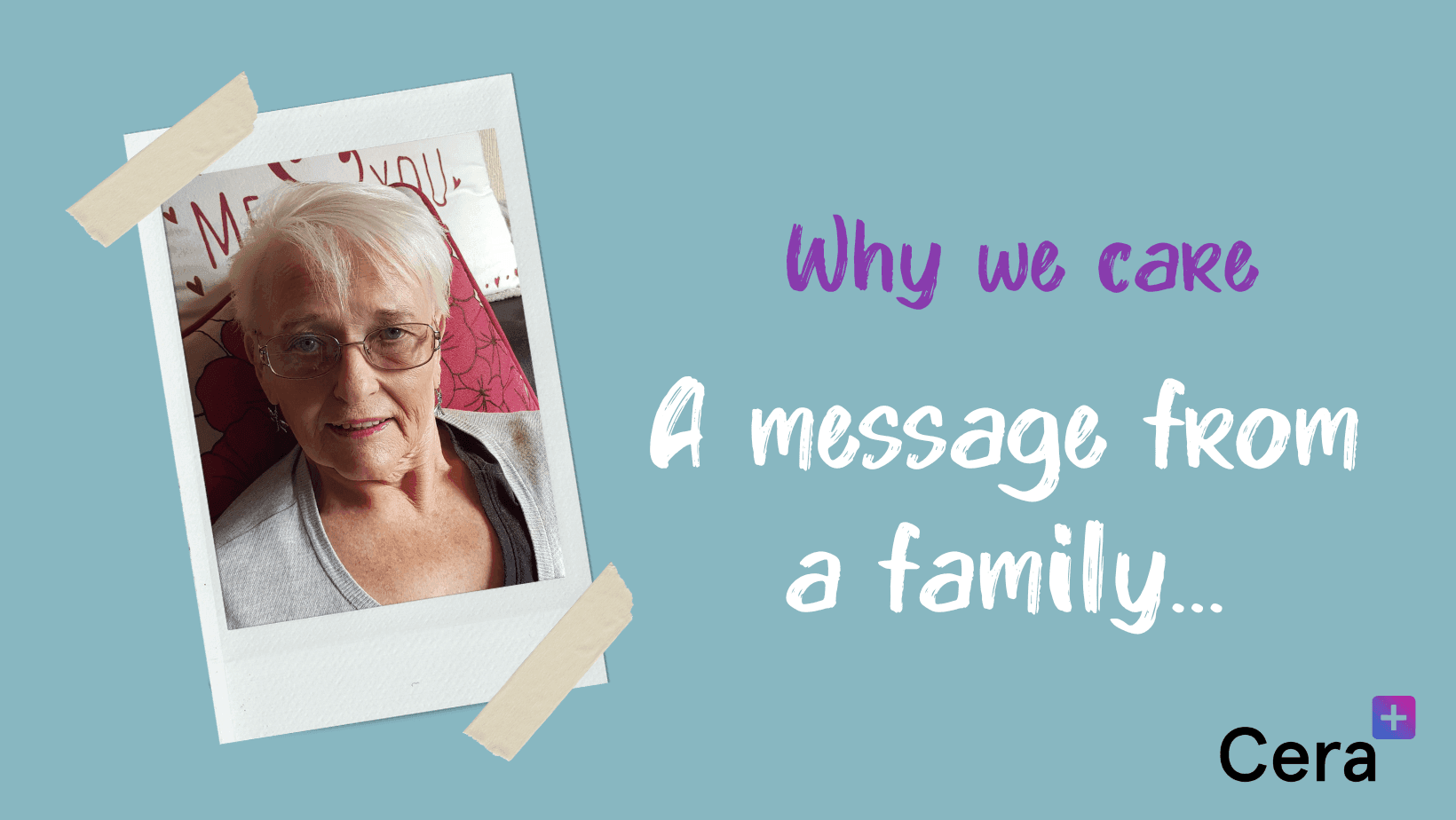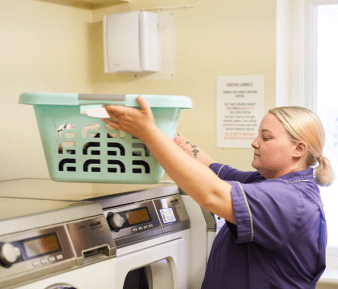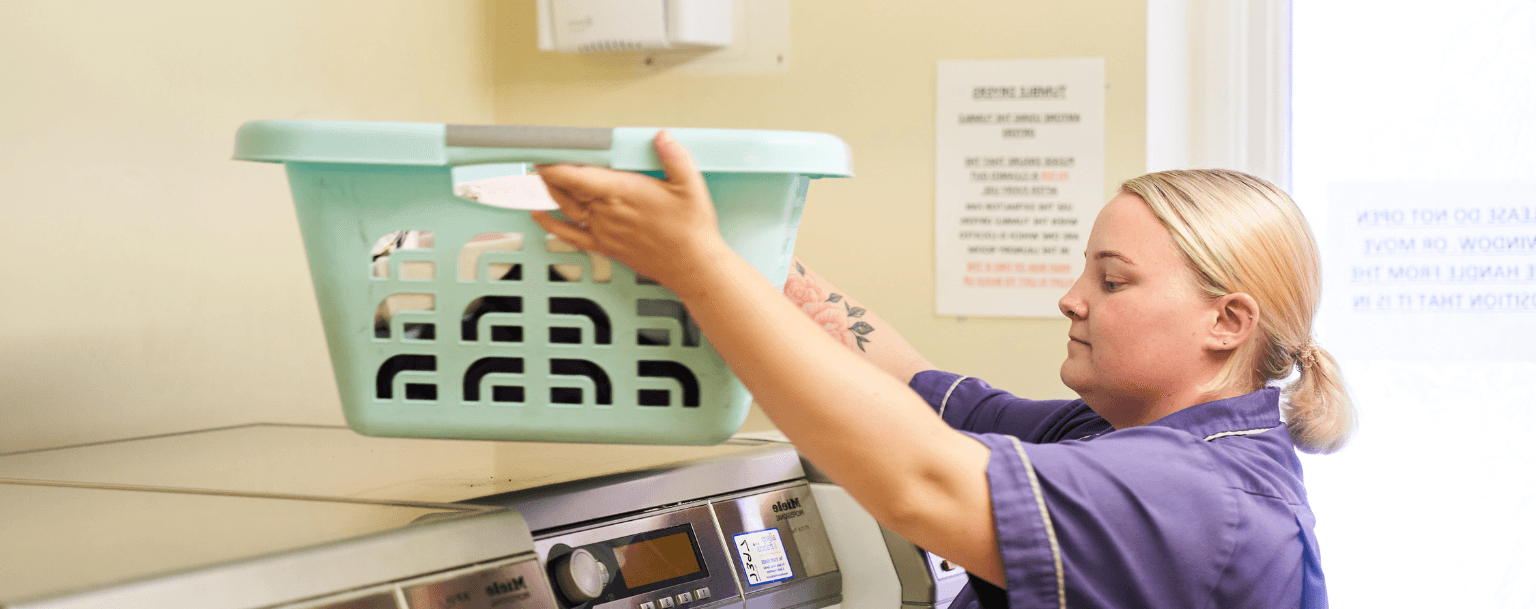What is a Community Care Assistant?
What is involved in a community Care Assistant job?
If you’re considering starting a career in care, or want to explore new social care roles, you might find yourself confused about different job titles. Many home care organisations use different names for similar roles, and this can make it hard to find the right role for you.
We’ve put together a guide to explain what you might be expected to do in a community Care Assistant role at Cera, one of the many support roles available in the healthcare and care-at-home industry.
What does a community Care Assistant do?
In a care assistant job, you’ll provide support for someone to help them maintain their independence. Most of your service users will be older people, and some will have mobility difficulties or a diagnosis of dementia. As a care worker, you'll be working with vulnerable people who rely on your assistance for their daily activities.
You may be expected to do some personal care, meal preparation, housework and, most importantly, provide a listening ear when they need you. You’ll need to have excellent communication skills, be warm, friendly and patient as you work with service users.
Some service users live alone and others live with family or housemates. For someone living alone, you may be one of their only visitors, so you have a massive part to play in checking they’re okay and ensuring their health and wellbeing.

Personal care may include:
- Helping a service user get out of bed in the morning and go to bed at night, as well as moving around their home when necessary
- Preparing meals and feeding
- Supporting a service user to go to the toilet or manage continence care
- Bathing or showering support
- Providing support with getting dressed
- Prompting or helping to administer medication
Care workers follow a service user’s care plan, so your tasks will vary depending on the person you’re supporting. Some people may need full support with toileting, feeding and lifting multiple times a day, whereas others may just need a small amount of help with meal preparation and medication.
You’ll need to do a bit of admin work during or after each visit too. This involves maintaining client records to document information about what you've done during your visit, any problems that might have occurred or anything new you need to flag up, and some general information about the service user.
At Cera, most of the admin work is done via an app, making it quick and easy for all of our Care Assistants and healthcare workers to have the same information. We’ll provide you with a work phone to make sure you can access it easily.
Where does a community Care Assistant work?
Community Care Assistants work in their service users’ own homes – out in the community, hence the name! Other care workers might support people in care homes, hospices, sheltered accommodation or other settings.
Some Care Assistant roles are “live in”, where they live with a single service user. Most Care Assistants just visit people's homes to provide care.
You’ll probably travel between different locations over the course of your working day (or night!). You’ll work within a certain area, but you’ll need to travel quickly between homes.
Care Assistant jobs are advertised all over the UK, so wherever you’re based, you’ll probably find local vacancies for various social care roles.
Due to the amount of travel involved in the job, most Care Assistants at Cera need to have a full driving licence and have their own vehicle. You may need to talk to your car insurance provider and explain that you drive for work purposes, as this can affect your insurance cover.
What hours does a community Care Assistant work?
Care work can be a fantastic career for someone who doesn’t want to work a standard 9-5 job. Our service users need support at all hours of the day and night. So, whatever time of day it is, there’s bound to be a care worker on duty somewhere.
As a care assistant, you might want to take full or part-time hours – or you may even want a flexible hours role. You might work early or late day shifts, or overnight. Our clients need care every day, so our Care Assistants work a mix of weekdays and weekends. You may need to be available to work Saturdays and Sundays for a lot of care worker and healthcare assistant roles.
As a Care Assistant, you might want to work full or part-time hours – or you may even want a flexible hours role to fit around family or other commitments. You might choose to work early or late day shifts, or overnight.
Working evenings or doing nightshifts can be a good choice for families who are trying to cover their childcare needs without paying for nurseries or childminders, who want to work while there’s another parent at home.
Talk to the team at Cera about your schedule and the hours you’d be able to work. Whatever your work schedule needs, there’s likely to be a Care Assistant job that fits!
What qualifications does a community care assistant need?
There’s a wide range of entry-level Care Assistant roles, so you won’t need any specific qualifications – or even any paid care experience. The entry requirements are minimal, focusing more on your personal qualities and dedication to helping others. Although if you have experience and qualifications, that’s great too!
At Cera, we look for people who are compassionate, friendly and want to help others – we can train you on the rest. Find out more about What makes a good Care Assistant and the essential qualities needed for carer and support worker roles.
We’ll run a DBS check on you (we pay for this) to ensure you’ve not got any history that might disqualify you for the role.
We’ll make sure you’ve had all the necessary training, including some online learning and shadowing a senior care worker to build your confidence. You’ll be able to get your Care Certificate within three months of starting your role, and after that, we’ll provide regular training refresher and update sessions.
Our care workers often go on to complete apprenticeships, diplomas or other vocational qualifications, opening up opportunities for career progression in the care sector. Some may advance to become a team leader, field care supervisor, registered manager or take on other leadership roles in social care.
In conclusion, a career as a community care assistant offers a rewarding opportunity to make a real difference in people's lives. With a focus on providing essential support, engaging service users in social activities, and ensuring the wellbeing of vulnerable individuals, this role is perfect for those with strong people and communication skills, and a genuine desire to help others. Whether you're just starting your journey in care work or looking to expand your experience in healthcare, becoming a community care assistant could be the perfect next step in your career.
More about working in care

Nutrition and Hydration - Essential Care for the Elderly
Good nutrition and hydration is vital for everyone, and it's especially important for elderly individuals.
Why we care - a message from a family
A family's note of thanks to the carers who provided comfort, dignity, and peace during their gran's final days.

